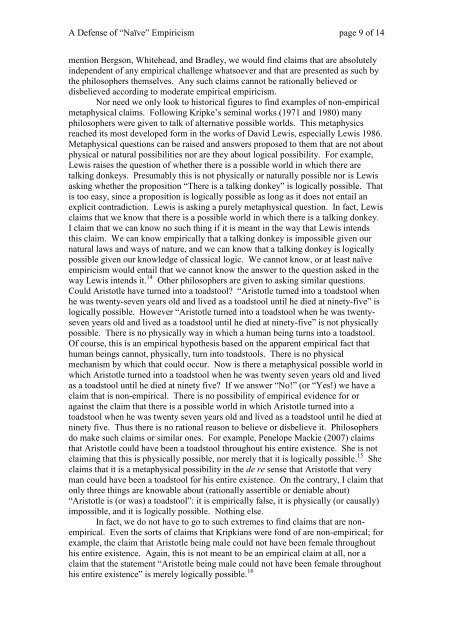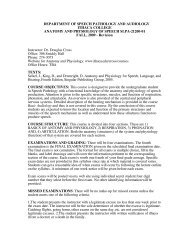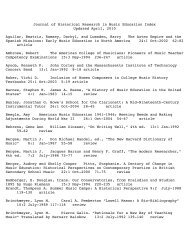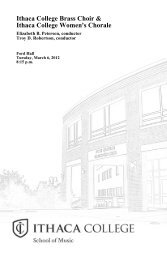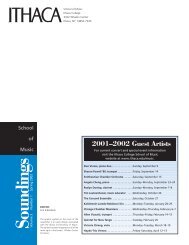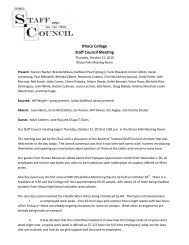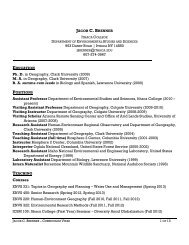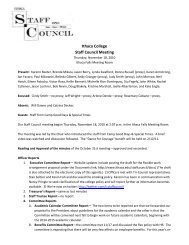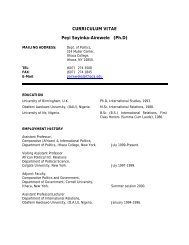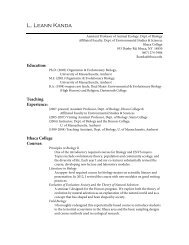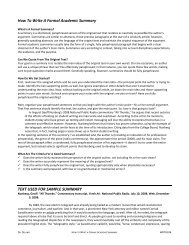A Brief Defense of Empiricism - Ithaca College
A Brief Defense of Empiricism - Ithaca College
A Brief Defense of Empiricism - Ithaca College
Create successful ePaper yourself
Turn your PDF publications into a flip-book with our unique Google optimized e-Paper software.
A <strong>Defense</strong> <strong>of</strong> “Naïve” <strong>Empiricism</strong> page 9 <strong>of</strong> 14<br />
mention Bergson, Whitehead, and Bradley, we would find claims that are absolutely<br />
independent <strong>of</strong> any empirical challenge whatsoever and that are presented as such by<br />
the philosophers themselves. Any such claims cannot be rationally believed or<br />
disbelieved according to moderate empirical empiricism.<br />
Nor need we only look to historical figures to find examples <strong>of</strong> non-empirical<br />
metaphysical claims. Following Kripke‟s seminal works (1971 and 1980) many<br />
philosophers were given to talk <strong>of</strong> alternative possible worlds. This metaphysics<br />
reached its most developed form in the works <strong>of</strong> David Lewis, especially Lewis 1986.<br />
Metaphysical questions can be raised and answers proposed to them that are not about<br />
physical or natural possibilities nor are they about logical possibility. For example,<br />
Lewis raises the question <strong>of</strong> whether there is a possible world in which there are<br />
talking donkeys. Presumably this is not physically or naturally possible nor is Lewis<br />
asking whether the proposition “There is a talking donkey” is logically possible. That<br />
is too easy, since a proposition is logically possible as long as it does not entail an<br />
explicit contradiction. Lewis is asking a purely metaphysical question. In fact, Lewis<br />
claims that we know that there is a possible world in which there is a talking donkey.<br />
I claim that we can know no such thing if it is meant in the way that Lewis intends<br />
this claim. We can know empirically that a talking donkey is impossible given our<br />
natural laws and ways <strong>of</strong> nature, and we can know that a talking donkey is logically<br />
possible given our knowledge <strong>of</strong> classical logic. We cannot know, or at least naïve<br />
empiricism would entail that we cannot know the answer to the question asked in the<br />
way Lewis intends it. 14 Other philosophers are given to asking similar questions.<br />
Could Aristotle have turned into a toadstool? “Aristotle turned into a toadstool when<br />
he was twenty-seven years old and lived as a toadstool until he died at ninety-five” is<br />
logically possible. However “Aristotle turned into a toadstool when he was twentyseven<br />
years old and lived as a toadstool until he died at ninety-five” is not physically<br />
possible. There is no physically way in which a human being turns into a toadstool.<br />
Of course, this is an empirical hypothesis based on the apparent empirical fact that<br />
human beings cannot, physically, turn into toadstools. There is no physical<br />
mechanism by which that could occur. Now is there a metaphysical possible world in<br />
which Aristotle turned into a toadstool when he was twenty seven years old and lived<br />
as a toadstool until he died at ninety five? If we answer “No!” (or “Yes!) we have a<br />
claim that is non-empirical. There is no possibility <strong>of</strong> empirical evidence for or<br />
against the claim that there is a possible world in which Aristotle turned into a<br />
toadstool when he was twenty seven years old and lived as a toadstool until he died at<br />
ninety five. Thus there is no rational reason to believe or disbelieve it. Philosophers<br />
do make such claims or similar ones. For example, Penelope Mackie (2007) claims<br />
that Aristotle could have been a toadstool throughout his entire existence. She is not<br />
claiming that this is physically possible, nor merely that it is logically possible. 15 She<br />
claims that it is a metaphysical possibility in the de re sense that Aristotle that very<br />
man could have been a toadstool for his entire existence. On the contrary, I claim that<br />
only three things are knowable about (rationally assertible or deniable about)<br />
“Aristotle is (or was) a toadstool”: it is empirically false, it is physically (or causally)<br />
impossible, and it is logically possible. Nothing else.<br />
In fact, we do not have to go to such extremes to find claims that are nonempirical.<br />
Even the sorts <strong>of</strong> claims that Kripkians were fond <strong>of</strong> are non-empirical; for<br />
example, the claim that Aristotle being male could not have been female throughout<br />
his entire existence. Again, this is not meant to be an empirical claim at all, nor a<br />
claim that the statement “Aristotle being male could not have been female throughout<br />
his entire existence” is merely logically possible. 16


